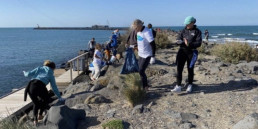Planet: Biodiversity and the fight against global warming
Caring for life and our planet has been the driving force behind the ENGIE Foundation for over 30 years.
With 50% of its projects dedicated to access to renewable and sustainable energies and to biodiversity by 2023, the ENGIE Foundation is committed to the environment year after year. The aim is to participate in ambitious, high-impact projects and to contribute to the collective effort of the Agenda 2030 through the achievement of the Sustainable Development Goals (SDGs) and to carry ENGIE’s raison d’être: this is what guides the action of the ENGIE Foundation daily.
With the ENGIE Foundation, take action to preserve biodiversity in France and abroad to:
- Protect biodiversity and ecosystems
- Better understand and explore the richness of biodiversity
- Educate and raise awareness of biodiversity preservation
Work with partners on emblematic projects such as the Museum National d’Histoire Naturelle, the Office Français de la Biodiversité and the CNRS Foundation.
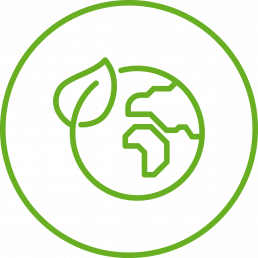
Protecting biodiversity
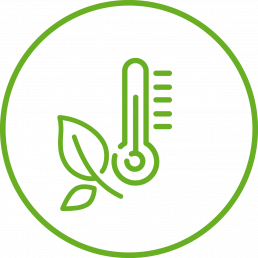
Fight against global warming
Biodiversity and the protection of the oceans are one of the major focuses of the ENGIE Foundation’s action, based on 5 priorities:
- Supporting research to better understand biodiversity
- Supporting exploration
- Concrete actions to combat waste and protect marine biodiversity.
- Raising public awareness, especially among schoolchildren,
- advocacy actions by federating stakeholders and supporting debates
Working with partners such as UNESCO, the Fondation de la Mer…
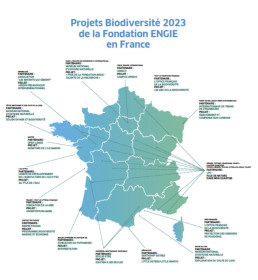
Access to energy as a driver of sustainable development
Worldwide, 1.3 billion people have no access to energy and/or essential goods. But is it reasonable to develop access to energy for all, in a context where ecological balances and biodiversity are under threat? For the ENGIE Foundation, the answer is clear: yes, energy is a right for everyone! For without energy, there can be no access to drinking water, no schools, no hospitals, and little or no economic activity.
Access to energy with ENERGY ASSISTANCE
Created first in Belgium in 2001, then in France in 2005 by ENGIE employee volunteers wishing to put their know-how at the service of populations affected by disasters or lacking access to energy, the NGO Energy Assistance (EA) puts the skills and know-how of its members at the service of humanitarian projects aimed at populations with no or very limited access to essential energy services…generally for the electrification of health centers, schools or through the development of income-generating activities.
Setting up decentralized power generation systems (using renewable energy), connecting isolated communities to the grid, rehabilitating electrical installations… that is the reality of a project.
All over the world, volunteers from the NGO Energy Assistance set off on missions to give the most disadvantaged access to energy.
“Each mission is a human adventure, from which they return transformed, and which contributes to giving meaning to their work”, emphasizes Eric Bassac – President of Energy Assistance France.
“There’s a growing appetite, especially among young people. More of them are spending time with us. With the ENGIE Foundation, in line with the Group’s priority of attracting young female talent, we are aiming for parity in our teams”, says Tony Moens de Hase.
To ensure the continuity, visibility and dynamism of Energy Assistance, the ENGIE Foundation provides the main support.
Each time, ENGIE employees or retirees are at the helm, as permanent staff or volunteers. And the objective is always the same: to provide expertise and technical resources to give access to energy to those who have none.
Co-construction, skills transfer, coalitions
In the twenty years since Energy Assistance was founded, a great deal has happened.
- First, access to energy has grown considerably. The work of NGOs like Energy Assistance has focused on providing energy to those “forgotten by the grid” and in isolated habitats.
- Secondly, there is now local collaboration involving companies and training centers. Before, reliable equipment was not available locally. Today, local companies supply quality equipment, which is much better for follow-up and maintenance.
- Third: to ensure optimum maintenance, most of the projects deployed by Energy Assistance include training for local technicians. This is essential. Finally, we work in coalition with other NGOs such as ACTED and Reach out in Morocco.
ENERGY ASSISTANCE since 2001:
528 projects
5,816,000 beneficiaries
50 countries
Portrait of committed women employees
Combating the effects of global warming and improving living conditions in Bangladesh with Friendship
For more than 10 years, the ENGIE Foundation has been working alongside the NGO Friendship to build community capacities, encourage major contributions from women, facilitate access to solar energy and training, and protect biodiversity.
Restoration of 14 hectares of mangroves in southern Bangladesh
One of Bangladesh’s greatest assets is the world’s largest mangrove forest, the Sundarbans, a UNESCO World Heritage site. Unique and diverse coastal ecosystems, mangroves are a formidable tool in the mitigation of climate change, thanks to their great capacity to absorb CO2.
However, many mangrove reforestation projects in Bangladesh are not sustainable because they consist of non-resilient monocultures, are not effectively managed during the growth phase, are sometimes planted with species not adapted to the area or fail to take socio-economic factors into account.
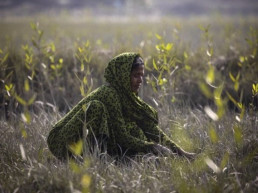
Planting of 14 hectares in 3 areas located in 3 villages of the Sakthiraj district (land is a scarce commodity in Bangladesh and it is difficult to have single plots available for reforestation).
The first two areas (30,000 trees) were planted in October 2022 by local communities under the supervision of Friendship and local forestry experts. The third (12,000 trees) is scheduled for May 2023. In all, almost 2,000 meters of dikes will be protected against flooding thanks to this project, bearing in mind that the damage caused by salt water can persist for an exceptionally long time (flooded soil becomes unfit for cultivation for years, just as a livestock pond invaded by salt water can no longer be used).
Six community groups of 30 people each received capacity-building training (prior to planting) in seeds, nurseries and planting; they also each took part in the first follow-up meetings.
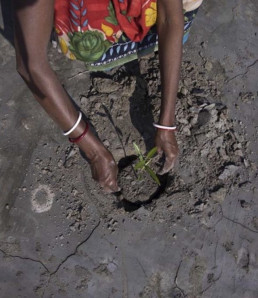
IMPACT: over the 3 zones, 240 participants will be trained, corresponding to between 1,200 and 1,440 direct beneficiaries (family members). Indirect beneficiaries will be far more numerous. They include all the villagers, farmers and fishers who will see their homes, fields and ponds protected from flooding and salinization.
Energy to improve living conditions in Bangladesh
Since 2011, with the support of the ENGIE Foundation and Energy Assistance France, the NGO Friendship has been developing a sustainable rural electrification project for remote villages in Bangladesh.
Friendship has designed and installed the first solar-powered electricity microgrid in the tanks of northern Bangladesh, inaugurated on August 22, 2021, in the presence of Mr. Nasrul Hamid, Bangladesh’s Minister of Electricity and Energy.
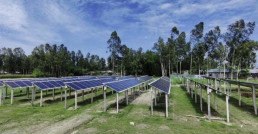
This solar village, built in the village of Goynar Potol, is now up and running, bringing well-being, prosperity and satisfaction to its inhabitants. The population of the Goynar Potol tank has grown considerably. The village grew from 150 to more than 500 houses in early 2022, due to the arrival of people from other islands that disappeared during the exceptional floods of 2020.
The solar village in figures:
3,000 inhabitants of Goynar Potol now have access to electricity
54 kWp of electricity generated by solar panels and stored in batteries
200 solar panels and 200 batteries installed
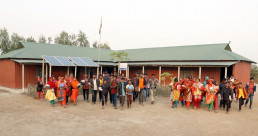
Thanks to the electricity generated and stored, every household will be able to operate lamps, fans, televisions and cell phone chargers daily. Light provides security at night and access to healthcare. Stores can stay open in the evening, generating new income for shopkeepers. Children can study in the evenings and follow lessons broadcast on television.
In 2023, Friendship and the ENGIE Foundation will ensure the continuity and technical optimization of the operation of the Goynar Potol solar village, as well as the strengthening of local capacities through a training plan to guarantee the sustainability of both the solar village and electrification in these remote areas of the country.



